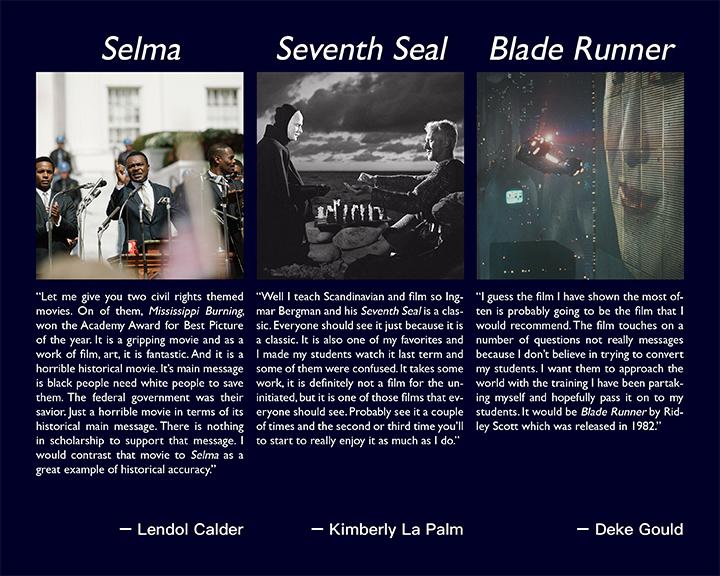Most people would think films are just summer blockbusters, oscar bait, or the new addition into the Marvel series. Yet, films are much more than just entertainment they’re tools for learning and understanding. Professors at Augustana utilize film in a variety of ways ranging from language to philosophy and much more.
In one aspect films offer a window into the past that textbooks could never show. Lendol Calder, professor of history, has been using films to teach history for quite some time now.
“I use it because visuals are the primary carrier of history,” Calder said. “People become historically conscious beings mostly through film.” Calder has a friend who is a cognitive scientist at Stanford who has been studying on how Americans become historical conscious people. Calder mentions that his friend found a common thread in every person’s interview that film was a major tool in how they know history.
Calder agrees and has been teaching two courses that are entirely film based.
“Everyone loves to watch films,” Calder said. “In history films make us create an empathic leap into a subject rather than listen to somebody talk about it. Film is so emotionally dramatic in a way that reading an essay is not.” Calder himself became interested in history as kid through film. Later while teaching Calder realized a way of enticing students to be engaged is through films. Each of Calder’s courses focuses on a topic like the American west, covering a group of people like African-American representation in film, and hollywood dramas through the years.
Calder has his students create research groups to see if the film is an accurate representation of the past.
“You need to know a lot about the subject of the film to really know if it’s accurate,” Calder said. “The films have helped us make a leap into the past.”
Calder mentions that accuracy is just the start of the discussion and that students go beyond in their research. Calder points out that a film could look accurate with the technology and attire, but not in the message that aligns with what history has shown. Overall Calder wants his students to think like historians as they view films.
Films can show the past, but they can also ask questions about the future. Recently, Deke Gould, professor of philosophy, showed his FYI 103 students Blade Runner 2049 to offer questions on a variety of philosophical topics.
“Films have the potential, not all films, to engage people philosophical,” Gould said. “In a film you don’t have just a series of visuals but also have a narrative. Sometimes not even a coherent narrative that forces you to rethink things you assumed. So I do think there is something valuable looking at a film, specifically as another artifact, another tool for generating philosophical thought.”
Gould maintains that the cognitive experience of reading philosophical work is important to engage thinking, but that films also add the emotional experience. Gould mentions that people can gain this feeling by not just seeing films but also viewing music performances or theater.
Gould has shown “Her”, “Blade Runner”, “Ex Machina”, and more as extra credit opportunities within his curriculum.
“All of these films had different things to contribute to the curriculum,” Gould said.
Kimberly La Palm, professor of language, sees the use of film as a tool to help students understand culture and language of other groups of people.
“They are familiar with the rules of filmmaking and how do you interpret the way a story is presented onto film,” Palm said. “It helps showing them this medium that they are use to within a different cultural context.”
Currently Palm is teaching a second-level course that is all about Scandinavian film to help students understand the language better. Palm mentions that learning language through the teacher and the textbook is very slow talking and about topics that are usually weird and mundane. Films on the other hand provide students with everyday conversations within the Scandinavian region while being more advanced and challenging for the students.
Palm is hoping that in a few years another course will be taught in English that would cover the history of Scandinavian film.
Recently the department has presented a Scandinavian film festival that is a tribute to the late Professor Larry Scott who taught at Augustana from 1981 to 2013. Scott himself was known to be a film lover and taught the course mentioned earlier.
“This is part of the reason why we are doing the Scandinavian film festival this year,” Palm said. “We wanted to do something to honor him. It is a tribute to him and his history at Augustana.”
Graphic by Tony Dzik
Categories:
History, language, questions presented through film
April 19, 2018
0
More to Discover










































































































